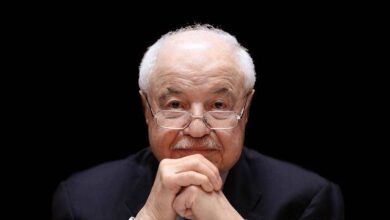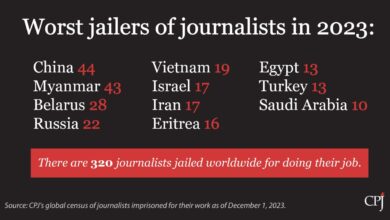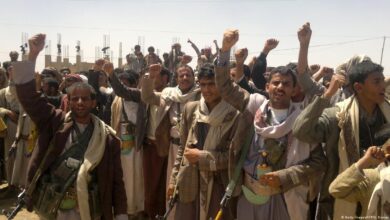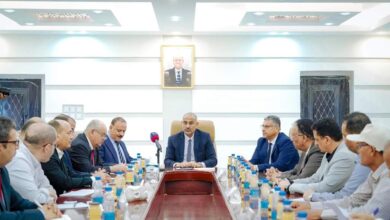مركز صنعاء للدراسات الاستراتجية “Not Our War”

فبراير 02, 2022
عدد المشاهدات 668
عدد التعليقات 0
Not Our War
IN THIS NEWSLETTER:
The Impact of War on Civil Society Organizations in Marib
Women’s Non-Traditional Roles in Tribal Societies
Social Fragmentation and Restoration in Taiz
Tribes and the State in Yemen
Saudi Arabia’s Role in Southern Yemen
Women in Hadramawt Organize to Alleviate Travel Restrictions, Providing a Model for Civic Engagement
The Impact of the Yemen War on the Priorities and Needs of Youth
Yemen’s Tribes Offer a New Path Toward Peace
Not Our War: A Vision for Peace from Yemeni Youth and Civil Society
Barda Podcast | Social Media and the Yemeni Trend
The Impact of War on Civil Society Organizations in Marib
By: Mehdi Balghaith, Sadam al-Adwar
Nestled in central Yemen and bordering several other major governorates, including the capital Sana’a, Marib has stood out as the main engine of the country’s economy in recent decades. However, despite its oil and gas wealth, the governorate remained impoverished due to a policy of marginalization adopted by the government of late president Ali Abdullah Saleh, depriving it of basic infrastructure, development and economic projects. Among the repercussions of this policy was a lack of civil society organizations (CSOs) to support residents in the absence of government services. Prior to 2011, local CSOs were few in number. Some were only semi-active, leaving just a few organizations operating, unsustainably, in the fields of development, charity and cooperation.
This policy brief addresses the rise of local CSOs in Marib governorate between 2015 and 2020, focusing on the impact of the war on their internal and external working environment and on their activities and performance, including the most important changes civil society has undergone. It presents the views of various key stakeholders in Marib’s civil society and the challenges they faced during that period. It also makes recommendations to improve the work of CSOs and their access to cooperation and partnership opportunities with international organizations both in wartime and after.
Read more
Women’s Non-Traditional Roles in Tribal Societies
By Rim Mugahed, Bilqees Al-Lahbi, Magnus Fitz
As the war in Yemen enters its seventh year, the situation appears bleak and opportunities for peace grow fewer by the day. Amid the country’s fragmentation, the emergence of de-facto authorities and the almost complete absence of the state, local communities must rely on themselves to maintain peace. In this context, tribes have emerged as a decisive factor in maintaining social cohesion and security. But their ability to perform this role has been weakened by the political and sectarian polarization that existed even before the war erupted.
The tribe is one of the most significant social models in managing community cohesion and security in Yemen, particularly taking into consideration the erosion of other local mechanisms of negotiation and mediation. The situation is complicated by the presence of local actors affiliated with regional powers and their associated forces, whether they are affiliated directly, such as the Saudi-led coalition and its allies, or indirectly, such as the armed Houthi movement and Iran.
Read more
Social Fragmentation and Restoration in Taiz
By Abdullah Alhaj
Already suffering from myriad crises propelled by the war – including economic degeneration, fuel shortages, insecurity and the collapse of healthcare and livelihoods – Yemenis have also had to contend with intra-communal, and even intra-familial, fractures. Tribal, sectarian and regional affiliations are routinely used by both the armed Houthi movement and the internationally recognized government to gain territorial advantage, further stressing local social relations.
This paper will examine the phenomena of increased social disintegration in one particular governorate, which has become a microcosm of the war in Yemen: Taiz. It will also present proposals on how to avoid further fragmentation through serious attempts to heal rifts, including initiatives from within communities that could be adopted by local organizations..
Read more
Tribes and the State in Yemen
By Rim Mugahed
This three-part report by the Sana’a Center examines the multi-faceted relationship between tribes and the state in Yemen. It shows that this relationship has long been a complex one, with the relative power of each waxing and waning. However recently – starting before the current conflict began – a protracted period of co-option of tribal leaders into the state apparatus has led to both a strengthening of the wealth and influence of some individual sheikhs, and to a weakening of their links to their tribal members. Under former President Ali Abdullah Saleh, this policy gave rise to a tribalization of the state, with a consequent, multi-faceted impact on its functioning. This led to changes in the structure and influence of the tribes, accelerated by years of conflict and the rise of the Houthi movement. These factors – along with an economic crisis – have left tribal customs and laws shaky, with an absence of both traditional and state authority leading to fractured and more dangerous communities.
This has had an impact on women in particular, whose status in traditional societies has been undermined – although women continue to play key roles in mediation and peacemaking..
Read more
Between Hegemonic Aspirations and the Need for Peace and Stability:
Saudi Arabia’s Role in Southern Yemen
By Hussam Radman
Close engagement with Yemen has been one of the fundamentals of Saudi foreign policy since modern Saudi Arabia was established in 1932. Saudi policy toward Yemen has been shaped by four basic factors: Yemen’s foreign and domestic policy; regional and international developments; the nature of the Saudi regime and its decision-making mechanisms; and the political and security consequences of having a long, shared border. Saudi Arabia has experienced three major political events to its south: the 1962 revolution in North Yemen, the rise of the socialist regime in South Yemen in 1967, and the unification of North and South Yemen in 1990. Riyadh employed a range of soft power tools including a network of local alliances, dispensing economic aid, and propagating its Sunni Islamic ideology – Salafi-Wahhabism – to maximize its political influence in times of stability and wage proxy wars in times of conflict. Before the current conflict, direct Saudi military intervention was restricted to protecting its borderlands, such as the 1969 war with the leftist government in Aden and the 2009 war with the armed Houthi movement (Ansar Allah)..
Read more
Women in Hadramawt Organize to Alleviate Travel Restrictions, Providing a Model for Civic Engagement
By Mohammed al-Katheri
Since the start of the Yemeni war in 2015, the capabilities of the internationally recognized government have weakened dramatically. It no longer maintains the traditional functions and attributes of a state, most notably sovereignty over its territory or control of the integrity of its borders. The government has been further hampered by the patchwork distribution of its military and security forces on the ground and a reliance on foreign partners. In the southern governorate of Hadramawt, state security weaknesses allowed the fall of the coastal city of Mukalla to Al-Qaeda in the Arabian Peninsula (AQAP) in April 2015. Left vulnerable by the redeployment of security forces to other fronts, the city remained occupied until AQAP was expelled by troops from the United Arab Emirates and Yemeni army the following year. But the reestablishment of government control did not precipitate a reopening of the city’s transportation infrastructure. Al-Rayyan International Airport and the eastern Al-Dhabba road, a major artery linking the city with the country’s east, remained closed, with deleterious effects. Residents faced significantly higher transportation costs and longer travel times as they were forced to use alternate routes or forgo travel entirely..
Read more
The Impact of the Yemen War on the Priorities and Needs of Youth
By Yazeed al-Jeddawy
Yet today, after years of war, the economic, political and social consequences of the conflict have forced a shift in the needs and priorities of the country’s youth. Indeed, the majority of them now live in a ‘new Yemen’ different from the one they had strived for. Now, they exist in a fragmented country with a collapsed economy, its social cohesion torn apart and narrow ways forward – often to the battlefield and suffering.
This report is the result of a qualitative study that explores how the ongoing war in Yemen has impacted the needs and priorities of the country’s youth, compared to their situation prior to the eruption of the conflict. It draws on focus group discussions, 18 in-depth interviews conducted with young Yemeni researchers, activists, NGO and INGO staffers, active members of youth-led peace-building coalitions and youth groups from marginalized communities..
Read more
The Sana’a Center Editorial:
Yemen’s Tribes Offer a New Path Toward Peace
By Sana’a Center Staff
For more than seven years international efforts to end the war in Yemen have focused on engaging the same local and regional stakeholders in a similar way and hoping they will act differently. This myopic approach has produced only failure and behooves a change in approach, one that engages parties with potential to influence the conflict who are outside the current paradigm for peacemaking. Seeking out and enlisting Yemen’s tribes to facilitate conflict mediation and deescalation should be an obvious choice to begin that new path forward.
Local tribal mediation in numerous areas across the country has resulted in the warring parties exchanging many thousands prisoners throughout the conflict, where years worth of high-profile United Nations-led efforts to do the same bore fruit only once, in October 2020, with only a fraction of the number of prisoners returned to their families. Tribal mediation has also regularly facilitated the movement of people and goods across active frontlines, ended sieges of towns and villages, and facilitated the exit of armed groups from various areas without a shot being fired. Tribal leaders, using traditional means and their local purchase, have demonstrated time and again that they are able to bridge the animosities between the warring sides in a way the international actors are unable to, and yet to date international peace efforts have sidelined them in favor of tried and failed western institutional approaches..
Read more
Not Our War:
A Vision for Peace from Yemeni Youth and Civil Society
By: Tawfeek Al-Ganad
It has been seven years since the armed Houthi movement took control of Sana’a, leading to a brutal war as a coalition led by Saudi Arabia has sought and failed to restore the internationally recognized Yemeni government to power. Efforts to end the conflict, led by a succession of United Nations envoys, have also failed.
To achieve a sustainable peace, Yemen’s youth must be included; most of the population is under the age of 30. Young people have been active in civil society initiatives and volunteering throughout the war; they have also been active fighting on Yemen’s frontlines as education and employment opportunities have diminished.
This paper looks first at young people’s perceptions of the conflict, the parties involved and the war’s underlying causes, as well as scenarios to end the war. It also examines the economic and social impact of the war, with a special focus on marginalized groups, as well as the rise of volunteerism during the conflict. The paper then explores young people’s perceptions of the peace process and the actors influencing peace, as well as their visions for improving the peace process.
Read more
Barda Podcast | Episode 4 | Social Media and the Yemeni Trend
By Safaa Al-Watari
Barda is a podcast where we discuss development and social projects and initiatives. It showcases local experiences of Yemeni youth and highlights their achievements. It is targeted at Yemeni youth, aiming to help them develop a deeper understanding of social and development issues.
Episode guest:
Mazen Alsaqqaf – Content creator
Listen to podcasts
Copyright © Sana’a Center for Strategic Studies, All rights reserved.
Sana’a, Yemen | info@sanaacenter.org
Unsubscribe




